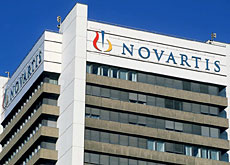Novartis suffers patent setback in India

Swiss pharmaceutical giant Novartis says it is unlikely to continue its legal challenge of Indian patent laws after a court rejected the case.
Watchdog groups said the decision was “a major victory for patients’ access to affordable medicines in developing countries”. But Novartis claimed patients would be denied new and better drugs.
The Madras High Court said on Monday that it had no jurisdiction on whether Indian law, which denies patents for minor improvements to existing drugs, contradicted international trade rules.
The row has been rumbling since January last year when the Indian Patent Office rejected an application from Novartis to protect the intellectual property rights of the leukaemia drug Gleevec.
India subscribed to World Trade Organization rules on intellectual property on January 1, 2005. But the country’s own patent laws deny protection to drugs that were patented before 1995 or are modifications or new forms of old medicines.
Gleevec fell foul of this clause despite being granted patents in 36 other countries.
The Basel-based company’s decision to challenge the law through the courts sparked a wider debate about how best to provide essential drugs to millions of patients on low incomes.
Novartis argues that without patent protection pharmaceutical companies will be commercially discouraged from producing new drugs.
But human rights groups accuse big pharma of striving to protect profits at the expense of less well-off patients by blocking other firms from producing cheaper imitations, or generic versions.
Case grinds to a halt
“This is a huge relief for millions of patients and doctors in developing countries who depend on affordable medicines from India,” said Tido von Schoen-Angerer, director of Médicin Sans Frontières’ Campaign for Access to Essential Medicines.
“We call upon multinational drug companies and wealthy countries to leave the Indian patents act alone and stop pushing for ever stricter patent regimes in developing countries,” he added.
Novartis India vice-chairman and managing director Ranjit Shahani appeared to concede defeat on Monday.
“We disagree with this ruling, however we likely will not appeal to the Supreme Court. We await the full decision to better understand the court’s position,” he said.
But Paul Herrling, the company’s head of corporate research, said Indian patent law would have “negative consequences for patients and public health in India”.
Economic advantage
Speaking to swissinfo earlier this year Herrling suggested that the row centred on preserving India’s thriving generics industry that stands to gain commercially from relaxed patent laws.
“It reflects an important battle that is ongoing in India. There are two groups of companies, the big industrials who are contemplating going into innovation and then there are the other ones who don’t want to go into innovation and want to keep the privilege of copying drugs that still have patent on them,” he said.
However, the lobby against restrictive patent laws has gained momentum in recent months with former Swiss cabinet minister Ruth Dreifuss this year coming out against Novartis’s legal proceedings in India.
A separate hearing by the Intellectual Property Appellate Board on the refusal to grant Gleevec patent protection has yet to take place.
swissinfo, Matthew Allen
Novartis launched Gleevec (or Glivec), which halts the spread of cancer cells related to the blood disease chronic myeloid leukaemia, six years ago. It was released in India in 2002.
Last year it was Novartis’s second-most successful drug in terms of sales, generating $2.5 billion (SFr3.13 billion).
The Indian authorities have denied Novartis patent protection for the beta crystal, the active ingredient of Gleevec, ruling that it is an adaptation of an existing compound. The crystal has been granted protection in 36 other countries.
Novartis says 99% of Gleevec users in India get the drug free, but NGOs counter that generic versions of Gleevec are one tenth of the price. They say there are 25,000 new cases of chronic myeloid leukaemia in India every year.
The World Trade Organization’s Trade Related aspects of Intellectual Property Rights (Trips) agreement came into force on January 1, 1995.
It grants developing countries the flexibility to override patents with special licences to produce cheaper versions of a drug or allow parallel imports for urgent public health reasons. Countries had ten years to implement the rules.
The Indian Patent Office denied Gleevec patent protection in January 2006. Novartis challenged the decision in the high court of Chennai in August last year.
In February 2007 the Chennai court divided the case into two parts – an appeal against the decision not to grant Gleevec a patent (referred in April to the Intellectual Property Appellate Board) and a separate case on the legality of India’s patent law.
Novartis contested the appointment of the former head of the Indian Patent Board as a technical member of the new Intellectual Property Appellate Board, but the complaint was rejected in July. Novartis took this complaint to the High Court on August 1 and the appeal hearing has yet to take place.

In compliance with the JTI standards
More: SWI swissinfo.ch certified by the Journalism Trust Initiative











You can find an overview of ongoing debates with our journalists here . Please join us!
If you want to start a conversation about a topic raised in this article or want to report factual errors, email us at english@swissinfo.ch.